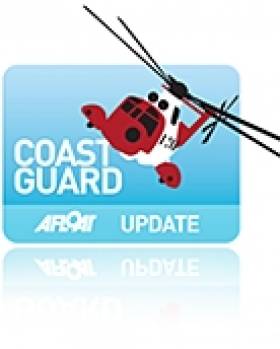Displaying items by tag: Declan Geoghegan
Coastguard 'Overwhelmed' By Response to Glandore Search Appeal
#NEWS UPDATE - The Irish Coast Guard told RTÉ News that it has received an "overwhelming" response from the diving community to its appeal to join the search in West Cork for two missing fishermen.
Skipper Michael Hayes and crewman Saied Ali Eldin are still missing after the fishing vessel Tit Bonhomme ran aground in rough seas near Adam's Rock at the mouth of Glandore Harbour.
Only one of the six-person crew - 43-year-old Abdul Mohammed – is confirmed to have survived. The bodies of Kevin Kershaw (21) and Attia Shaban (26) were recovered last week, while the remains of Wael Mohammed (35) were found by civilian divers near the wreck site last Sunday.
Coastguard manager Declan Geoghegan said that search teams now have the 48 divers required to conduct an exhaustive search of the wreck area and urged further volunteers not to travel for the moment.
The search will concentrate on the waters between Adam's Rock and Long Point, where much of the debris from the trawler has washed up.
RTÉ News reports that more than 200 volunteers are assisting the coastal search by boat and on land, which is being co-ordinated from the village of Union Hall.
Coast Guard Statistics Show more than 3,500 people assisted, a 20% increase on 2009
Today, the Irish Coast Guard published details of incidents responded to in 2010, which show the following important trends:
A total of 3,570 persons were assisted last year, a 20% increase on the 2009 figure. Total number of incidents responded to in 2010 was 1,839, consistent with total for 2009. A notable decrease in number of incidents involving leisure/recreational activities. The number of fatalities the Coast Guard responded in 2010 was 49, consistent with 2009.
Speaking today, Declan Geoghegan, Manager of the Irish Coast Guard said: "A total of 3,570 people were assisted by the Irish Coast Guard last year. The 20% increase on the 2009 figures is mainly due to the severe weather conditions at the end of 2010, when the Coast Guard provided assistance to all areas of the community including to An Garda Siochana, to local authorities but mainly to the HSE where transportation of patients, staff and GP's to various medical centres was required for a lengthy period. The Coast Guard also provided assistance to the farming community by airlifting animal feed during the severe weather."
Mr. Geoghegan continued: "A very positive development from the statistics, is the notable decrease in the number of incidents we responded to last year that involved leisure/recreational activites; the main ones being those that involved leisure craft and separately, diving incidents. This is directly attributable to the major effort that was made by the Marine Safety Working Group (chaired by the Irish Coast Guard at the Department of Transport) in alerting people to the dangers of these activities. In particular, the Marine Safety Working Group last year targeted tourists and newcomers to Ireland who may be unfamiliar with our coastline and geography and the dangers associated with it. The Marine Safety Working Group has produced safety leaflets aimed at the public (in English and other languages) to alert them to dangers and separately, to provide assistance when selecting equipment and planning trips."
The Irish Coast Guard responded to a total of 1839 separate incidents in 2010 which is constant with the 2009 figures, while the number of fatalities responded to has also remained constant with 2009 at a total of 49.
Mr. Geoghegan continued: "While it is welcome news that the number of incidents and fatalities the Coast Guard has responded to remained stable in 2010, a notable feature of the statistics show a marked increase in the number of hoax, nuisance calls and false alarms. We are working closely with an Garda Siochana in addressing hoax calls. Coast Guard Units right around Ireland are on standby today, as we are 24/7 to respond to incidents, to provide assistance and to save lives; maybe even yours. This is important work and something we take very seriously indeed."
Mr. Geoghegan concluded: I wish to take this opportunity to pass on some key messages from the Coast Guard to members of the public for 2011. These are:
If you are planning a trip along our coastline, or engaging in recreational activities in the sea or on inland waterways, plan your trip/activity carefully
Advise someone ashore of your plans
Check weather and tides
Check your craft and equipment
Know the area for boating, swimming, or angling
Never, ever go out alone.
If you see someone in difficulty, call 999 or 112 and ask for the Coast Guard.

























































